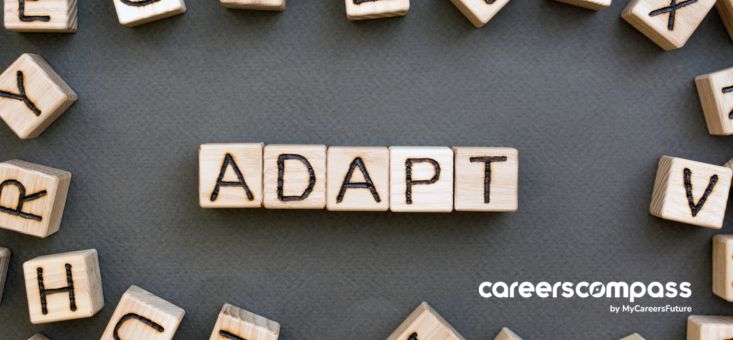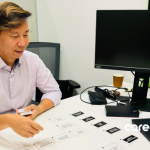Transitions are hard but unavoidable in all life stages. Students transition into higher education, adults move from their home country for work, and mid-careerists switch careers for a fresh start and growth.
Moving is the easy part, but learning how to adapt yourself to the unknown is a mindset game. Adapting means working without boundaries and discovering diverse solutions to tackle challenges stacked against you.
You can do this in many ways, but we’ve broken it down into just three simple steps.
Step 1: Improvise
Improvisation encourages a willingness to say ‘yes’ and to explore ideas rather than denying possibilities when things go south.
Think about a time when you ran out of a particular ingredient while cooking a meal. Instead of going grocery shopping for just one item, you get creative and replace it with a similar ingredient.
Or that big meeting you had with many important people, and suddenly the projector stops working. Do you call it off or spontaneously grab a whiteboard, get some printouts and keep the meeting going?
Improvisation requires acceptance, receptivity, agreement, working with what you have and experimenting with divergent ways to make it work. Your spontaneity jolts a shift in mindset and yields new thinking that empowers you to try something new. The aim is to develop a creative mindset that expands how you view and understand problems.
Ozgun Atasoy, the science writer of ‘Your thoughts can release abilities beyond normal limits’ wrote: ‘If mindsets can change us, maybe we can deliberately choose our mindsets to improve our abilities.’
Observing and imitation are the first simple steps to bring out the improviser in you. As you watch the pros handle a situation that usually calls for panic, observe how they tackle and conquer, then build or adjust your tactics and practice.
Step 2: Adapt
Exercising regularly builds muscle strength, memory, and stamina – improving endurance for everyday activities. Cognitive fitness is exercising your brain to better reason, remember, plan, learn, generate, experiment, and adapt.
Cognitively fit people make better decision-makers, problem solvers, and stress conquerors. While many believe that a person’s adaptability skills can only be built through experience, you can also gain such skills through observation and indirect experience, made possible by mirror neurons.
Identified by neuroscientist Giacomo Rizzolatti and team, these neurons help explain how and why you ‘read’ other people’s minds and empathise with them—that watching an action and performing the action evoke the same feelings in people.
For context, when you watch a certain leadership style fail from the sidelines, your brains pick up the mistakes and emotions of disappointment and come up with things you’d do differently, adapting so you’ll do it better.
Adaptability is a skill sewn together through the brain’s ability to scan through one’s surroundings, determine a structure, and create meaning from collected data to take accurate action.
How to build adaptability
Having moved over four countries now, Business Development Team Leader Keika Aoki shared that keeping an open mind, acceptance and taking charge helped her build on adaptability. She recalled making the effort to study the foreign culture, history and values had allowed her to see things through a different lens, appreciate the beauty of it and ease into change.
Step 3: Overcome
‘Nana korobi ya oki’ is a Japanese proverb that literally means ‘fall down seven, stand up eight’. To overcome means to prevail, defeat anything that causes any struggle, and emerge victorious.
Challenges can either make or break us and wholly depend on our reaction, choice of handling and the mindset we choose to adopt. A fighting, relentless spirit builds character and strengthens tenacity; label your struggles and never give them the satisfaction of bringing you down.
Keika also shared how she overcame the challenge of making friends when she moved to Singapore. She made her intentions known that she intended to grow her circle and build connections. When you become intentional about solving a challenge, you’ll be driven to make it work.
Everyone’s built differently; there’s no one-size-fits-all solution on how to overcome the various challenges and problems you face, but here are some starting points:
How do you overcome anything
Adaptability is a survival skill built through rigorously exercising your mind’s resilience, filling your conceptual storehouse with knowledge, and intentionally creating learning opportunities. Make life in the unknown an adventure for you.
This article is contributed by Good Jobs Creation.















